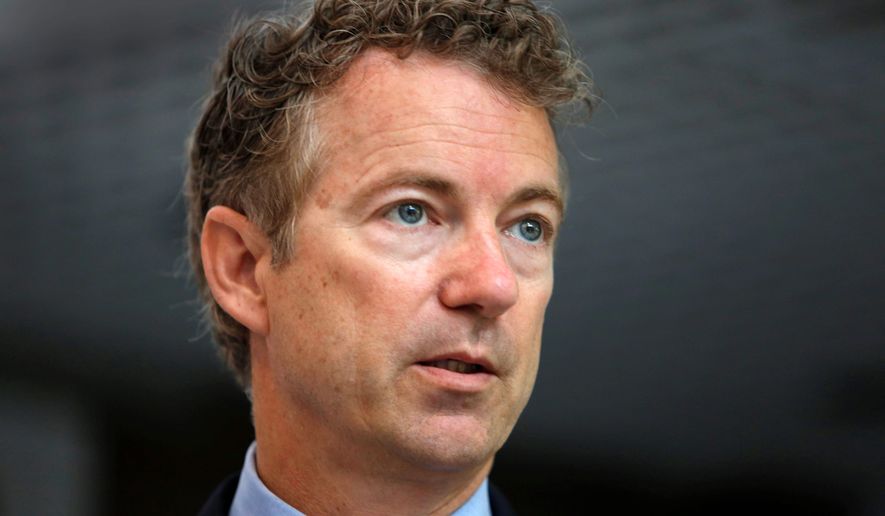Vowing to restore “fairness” to the tax system, Sen. Rand Paul outlined his plan Thursday to replace the federal code with a flat tax — instantly elevating tax reform to the highest levels of the presidential debate.
Mr. Paul, who announced his bid for the Republican presidential nomination in April, called for a 14.5 percent “fair and flat tax” to be applied to all types of income, including salary and wages, capital gains, dividends, interest and rent.
He said he would eliminate “nearly every special interest loophole” as well as the payroll and estate taxes. But he would retain the popular mortgage interest and charitable tax deductions, as well as the child and earned-income tax credit.
“My tax plan would blow up the tax code and start over,” Mr. Paul said in a Wall Street Journal op-ed.
The senator from Kentucky is touting the plan as Republican voters grow increasingly hostile to the IRS after the tea party targeting scandal and more recent reports that the agency was vulnerable to hackers who stole the most personal information of more than 100,000 taxpayers.
But the antipathy toward the IRS and the expanding tax code has not solved a central fight within the Republican Party between the flat tax, which is based on income, and a consumption tax, based on spending.
The most common consumption tax blueprint is known as the “fair tax” and has attracted the support of former Arkansas Gov. Mike Huckabee, another presidential hopeful. Meanwhile, former Texas Gov. Rick Perry and former Sen. Rick Santorum of Pennsylvania, both of whom also are seeking the White House, embraced a flat tax on income during their 2012 presidential campaigns.
Mr. Paul’s more ambitious plan earned him praise from David McIntosh, president of the Club for Growth, an influential group that fights wasteful government spending.
“It is a serious plan that eliminates tax gimmicks and creates one simple low rate,” Mr. McIntosh said. “The Club believes that Sen. Paul’s plan would be a huge step forward for the economy and for limited government.”
The Tax Foundation said Mr. Paul’s plan would boost the nation’s gross domestic product by 9.4 percent over a decade and add 1.4 million full-time jobs. But it also would reduce federal revenue.
Mr. Paul acknowledged that but said he will find spending cuts to offset the lower revenue.
“The immediate question everyone asks is: Won’t this 14.5 percent tax plan blow a massive hole in the budget deficit? As a senator, I have proposed balanced budgets and I pledge to balance the budget as president,” he said.
He did not outline his proposed cuts Thursday, though he has done so in the past, offering budget blueprints that have called for reducing the projected growth of defense spending, abolishing federal agencies, block-granting Medicaid dollars to the states and raising the retirement age of Social Security and means-testing benefits.
Mr. Paul said his tax proposal would unleash economic growth, lead to more jobs and “reduce the national debt by trillions of dollars over time when combined with my package of spending cuts.”
“I envision a traditionally All-American solution: Everyone plays by the same rules. This means no one of privilege, wealth or with an arsenal of lobbyists can game the system to pay a lower rate than working Americans,” Mr. Paul said.
• Seth McLaughlin can be reached at smclaughlin@washingtontimes.com.




Please read our comment policy before commenting.